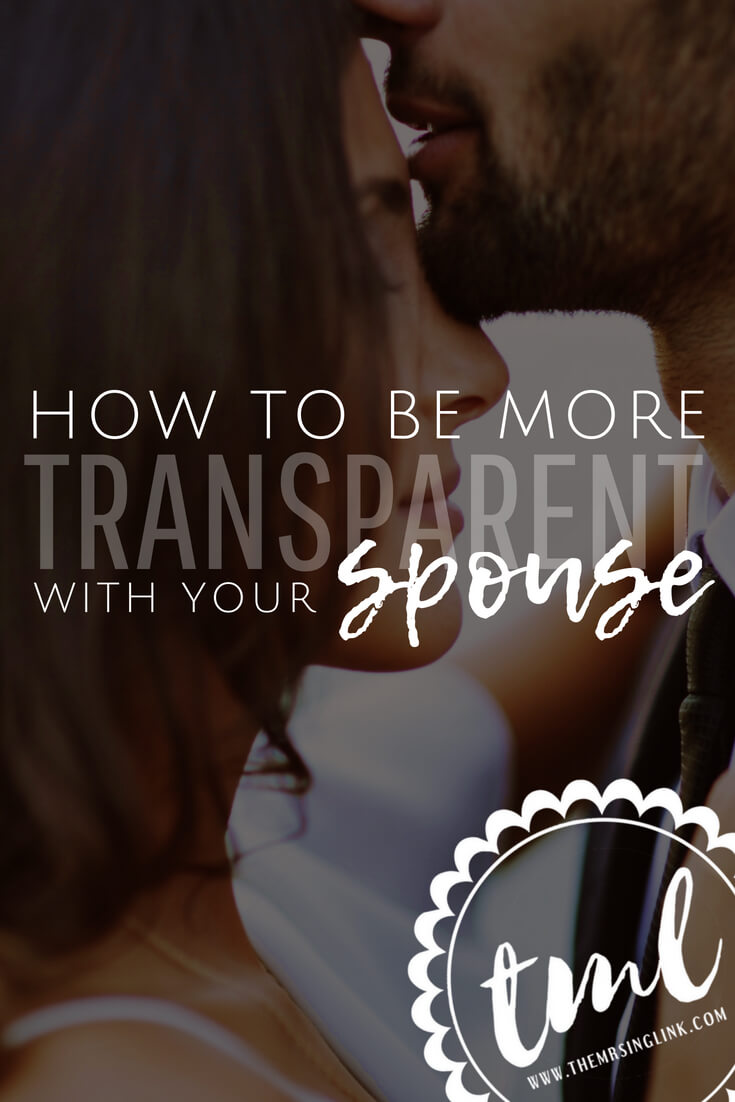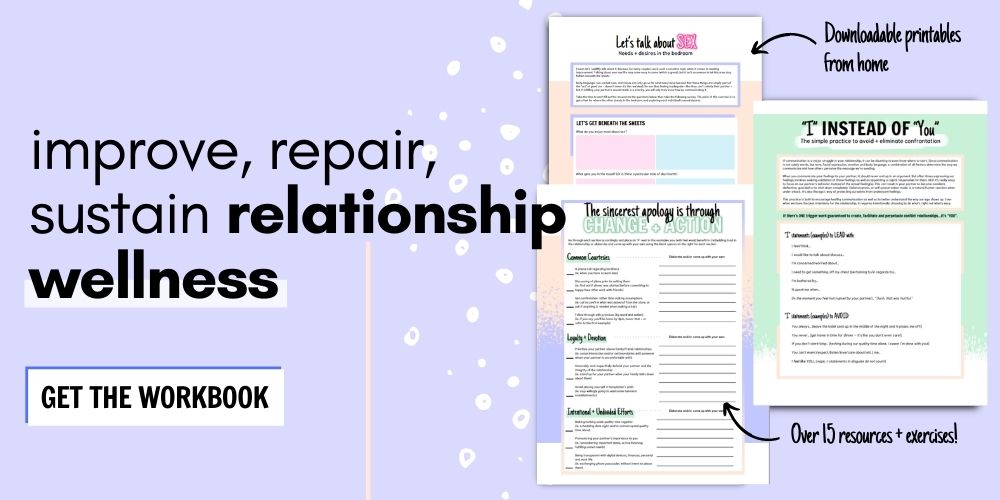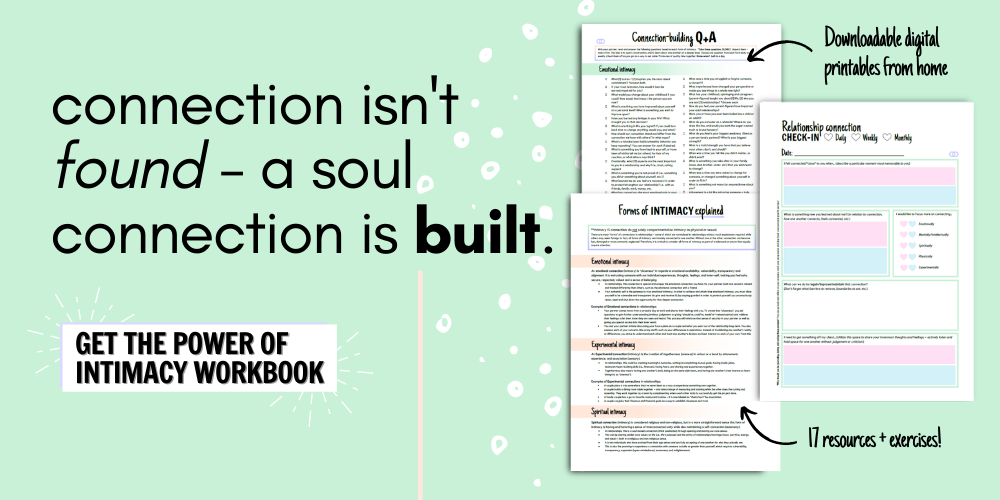In part [one] of this post, I talked about HOW transparency creates thriving relationships. If you didn’t get the chance to read it, you should in order to understand what transparency means, and why it is so important in our relationships, and in marriage. Part [two] goes into the ways you can be more transparent with your partner.
As a disclaimer: these aren’t the only ways to practice transparency. If you are especially dealing with lack of trust and honesty or feel it is a struggle to connect emotionally, then these are ways that transparency can certainly help. Transparency begins with self-connection, vulnerability, and honesty – otherwise, it can be difficult to maintain in your relationship.

4 ways to be transparent with your spouse
Vow to put one another FIRST
As I mentioned in part [one], the only way for transparency to flourish is that it must not only be mutual but a commitment. Like communication, transparency only thrives when it is a two-way street. It requires effort on both sides, because – no matter the circumstance – you are both in the same boat, together, regardless of which side is sinking.
When one end is sinking, the whole boat is sinking.
If you aren’t willing to put your partner’s best interest in front then here’s my question to you: why are you in that relationship? Truly, the concept of transparency is to make your partner feel seen, heard, valued and honored. More so to show them they are significant to you.
For instance, your partner should be the first person you share important or confidential news with – they deserve to know the ins and outs of your life first-hand before anyone else (yes, even before your mom and best friend). If you tend to focus on sharing details of your relationship, including your life, to those on the outside – this is a good time to refocus where and with whom your willingness to be transparent lies.
These courtesies are not a means of submitting to control, it is simply respecting and valuing one another’s time, boundaries, and feelings. Part of being transparent is, yes, releasing this mindset of control and considering your partner’s best interest as they are your own.

Lay your guard down together
All couples have disagreements. All couples have arguments. Happy couples have them, but they can acknowledge them as growth (and personal growth) opportunities. They share a common goal – connection over self-righteousness.
You and your partner are not enemies, even in the worst of times. You are together to support, build, strengthen and lean on one another. Without transparency emotional intimacy will seem nearly impossible. When you lay your guard down, you start revealing yourself – by stepping into what can seem like a harsh, unfiltered light. Your fears, guilt, flaws, desires, thoughts, trauma, and dreams exposed. This may include, yes, being more aware of how our personal triggers or shortcomings can get in the way of or inhibit intimacy.
When you learn to lay your guard down together – you’re more aware of these triggers and quicker to be more compassionate, understanding, and accepting of one another when faced with those bumps in the relationship road.
Talk openly – often
You are a team – striving to build a bond unlike with anyone else. In that bond, couples should be able to talk openly about life and life together – this includes finances, childbearing, parenting style, life aspirations, and personal goals, as well as all the ups and downs in between and along the way – the predictable and unpredictable – that relationships will face.
Granted, thanks to my blog and business, it definitely creates an outlet for my husband and I to talk about our marital goals (whether we are going through a rough patch or not). We mutually agree that our marriage doesn’t need to be in a bad place to talk about growth or to be making improvements.
Marriage is about constant growth – plain and simple. We’re ALL on our very own ‘self-growth’ and ‘healing’ journey that never ends, and so is your partner, whether they acknowledge or see that or not. Life and relationships are a journey without final destinations. There is no end-point, just death (including death of the relationship).
That said: if you aren’t evolving [together] – you aren’t growing [together]. And since communication is top tier as one of the ways that can make or break a relationship, being open to learning and understanding the way one another communicates, and how to communicate to connect is so, so, so important. That’s why I created the couple’s communication workbook geared to help accomplish just that.
[Related Read: “He Won’t Listen To Me” – 10 Tactics To Being Heard In Your Relationship]
Leave the book open on the table at all times
I am going to go ahead and apologize for stepping on some controversially triggered toes – for bursting your bubble on the meaning of transparency when it comes to your privacy.
If you are married – I personally believe that is the deepest promise of commitment you can make to another person. This means in no way, shape, or form should any aspect of your life be on automatic lock down.
People expected to find a soulmate without actually having to share their soul. And a soul connection just isn’t going to happen that way.
That isn’t to say privacy isn’t important – your individuality, sense of self, autonomy, and personal space MATTERS. This is why separation or “alone time” is still absolutely necessary in healthy relationships, and should even be encouraged as well as respected.
BUT, there’s also a difference between privacy and secrecy. As I mentioned in part [one], secrecy is not the same as privacy in relationships. If you consider the passcode to your phone or social media an aspect of your privacy, you are entitled to it. That comes with the understanding of consequential impact – on your partner and the relationship. For instance, if you broke the trust in your relationship (let’s say you lied to your partner about being in contact with an EX), your stronghold to keeping your phone or conversations private may not positively influence your willingness to be transparent in order to help regain your partner’s trust. To put it simply, if you’re safeguarding your privacy when the trust has been broken, you’re resisting transparency.
Although, many will say, “But if there is trust in the relationship, then my partner shouldn’t need access to my privacy [phone, texts, socials, etc.]…“
[Related Read: People care more about protecting their online digital world than their partner, and it shows]
First off, no one should ever NEED access to each other’s privacy. But I’m talking about your partner, here – your companion, husband, wife, boyfriend, or girlfriend – the person you’re [hopefully] committed to. Your partner shouldn’t need access to your privacy like you shouldn’t need to withhold it.
Neither of those routes creates or leads to intimacy.
Yes, in relationships, our privacy should be respected, to begin with, but why should it EVER be off-limits or stowed away with a lock and key? If you are in a relationship where privacy violation is prevalent or abused, the relationship itself should be in question. If it is brought upon by broken trust, it also means connection has been lost, and you can’t repair intimacy by closing up shop and still expecting to keep loyal customers.
[mailerlite_form form_id=26][Related Read: My husband and I share our phones and passwords *gasp* – this is a well-earned PRIVILEGE]
The point is there’s a balance between entrusting your partner to respect your privacy, as well as entrusting your partner to having access to it. The reality is: more than likely you are apprehensive or bothered by the thought of your partner [possibly] stumbling across something they won’t like, agree with, or that you have to hide. Alas, your partner taking (any inclination of) advantage of or seeming entitled to your privacy is a trigger for you.
So in order for intimacy – that deep, soul connection with your partner – take down the “Do Not Enter” or “No Trespassing” sign. Because when your partner is no longer welcome into your inner world, your privacy then becomes secrecy.
